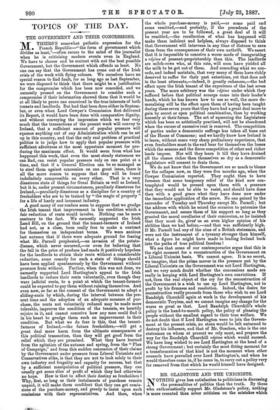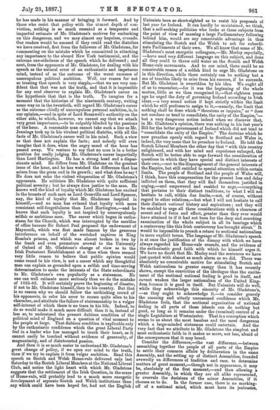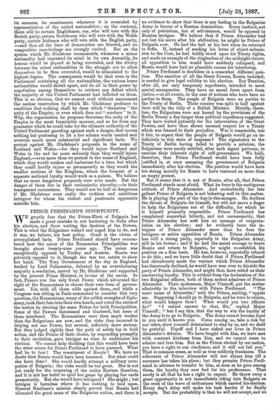MR. GLADSTONE AND THE UNIONISTS.
NOTHING gives lees satisfaction to politicians in discussing the personalities of politics than the truth. By those who enthusiastically support Mr. Glaclatone's policy, nothing is more resented than sober criticism on the mistakes which he has made in his manner of bringing it forward. And by those who resist that policy with the utmost depth of con- viction, nothing is so much resented as a temperate and impartial estimate of Mr. Gladstone's motives for embarking on this dangerous, and we may almost say hopeless, crusade. Our readers would be amused if they could read the diatribes we have received, first from the followers of Mr. Gladstone, for commenting on the mistake which he committed in attaching any importance to the absurd New York testimonial, and the extreme one-sidedness of the speech which he delivered ; and next, from the opponents of Mr. Gladstone, for dealing with his speech as the natural error of an enthusiastic and impetuous mind, instead of as the outcome of the worst excesses of unscrupulous political ambition. Well, our reason for not so treating that speech is very simple,—that we are very con- fident that that was not the truth, and that it is impossible for any cool observer to explain Mr. Gladstone's career on the hypothesis that that is the truth. To imagine for a moment that the historian of the nineteenth century, writing some way on in the twentieth, will regard Mr. Gladstone's career as the outcome chiefly of unscrupulous personal ambition, is, in our opinion,—and in spite of Lord Bramwell's authority on the other side, to which, however, we cannot say that we attach very great importance,—to be culpably blinded by the passions of the hour. A reasonable man cannot take such a line as Mr. Jennings took up in his virulent political diatribe, with all the facts of Mr. Gladstone's career well in his mind. Such a view as that does not explain the facts ; and nobody will even imagine that it does, when the angry mood of the hour has passed away. We venture to say that no man is in a better position for really judging Mr. Gladstone's career impartially than Lord Hartington. He has a strong head and a dispas- sionate mind. He differs from Mr. Gladstone on the greatest issue of the hour, and he has watched the difference that has arisen from the germ and in its growth ; and what does he say f He does not echo the violent vituperation of Mr. Gladstone's opponents. He criticises Mr. Gladstone with quite sufficient political severity ; but he always does justice to the man. He knows well the kind of loyalty which Mr. Gladstone has excited in the breasts of such men as Lord Granville and Lord Spencer, nay, the kind of loyalty that Mr. Gladstone inspired in himself,—and no man has evinced that loyalty with more consistent self-forgetfulness than Lord Hartington,—and he knows that such loyalty is not inspired by unscrupulously selfish or ambitious men. The career which began in enthu- siasm for the Church, which was interrupted by the sacrifice of office because Sir Robert Peel proposed the endowment of Maynooth, which was first made famous by the generous interference on behalf of the wretched captives in King Bomba's prisons, and which was almost broken in two by the frank and even premature avowal to the University of Oxford of Mr. Gladstone's change of view as to the Irish Protestant Establishment at a time when there seemed very little reason to believe that public opinion would come round to his view, is not a career which any thoughtful man can explain as grounded upon a selfish and time-serving determination to make the interests of the State subordinate to Mr. Gladstone's own popularity as a statesman. No one can well estimate more seriously than we do the mistake of 1885-86. It will certainly prove the beginning of disaster, if not to Mr. Gladstone himself, then to his country. But that is no reason why we should follow the unthinking crowd of his opponents, to refer his error to causes quite alien to his character, and attribute the failure of statesmanship to a vulgar self-interest of which there is no trace in his life. Indeed, to do so would make it much more difficult than it is, instead of less so, to understand the present dubious condition of the political mind of England on a question of vital moment to the people at large. That dubious condition is explicable only by the enthusiastic confidence which the great Liberal Party feel in a leader who has managed to touch their heart, as it cannot easily be touched without evidence of generosity, of magnanimity, and of disinterested passion.
And then it is so much easier to understand Mr. Gladstone's great change of policy, if we open our mind to the truth, than if we try to explain it from vulgar ambition. Bead this speech on Scotch and Welsh Home-rule delivered only last Saturday to the Scotch Liberal Members at the National Liberal Club, and notice the light heart with which Mr. Gladstone suggests that the settlement of the Irish Question, in the sense of Home-rule, will probably lead to a much more energetic development of separate Scotch and Welsh institutions than any which could have been hoped for, had not the English
Unionists been so short-sighted as to resist his proposals of last year for Ireland. It can hardly be maintained, we think, that a self-seeking politician who looks at these subjects from the point of view of massing a large Parliamentary following behind him, would see any conceivable advantage in thus stimulating the Scotch and the Welsh to ask for subordi- nate Parliaments of their own. We all know that some of Mr. Gladstone's moat energetic colleagues,—Mr. Morley especially, —have used very different language on this subject, and done all they could to throw cold water on the Scotch and Welsh Home-rule movements. And to our mind, there could be no conceivable reason of a selfish kind to urge Mr. Gladstone on in this direction, while there certainly can be nothing but a sea of troubles likely to arise from his success, if he succeeds. But Mr. Gladstone is overridden by his idea. We ought all of us to remember,—for it was the beginning of the whole matter, little as we then recognised it,—that eighteen years ago he urged the duty of governing Ireland according to Irish ideas,—a very sound notion if kept strictly within the limit which he still professes to assign to it,—namely, the limit that nothing shall be done which " threatens or impairs," or " does not conduce or tend to consolidate, the unity of the Empire,"— but a very dangerous notion indeed when we discover that, in Mr. Gladstone's opinion, there was nothing in his last year's Bill for the better government of Ireland which did not tend to "consolidate the unity of the Empire." The doctrine which he now preaches openly with regard to Scotland and Wales is, indeed, the very same that he preaches to Ireland. He told the Scotch Liberal Members the other day that " with this country enlightened, and with her mind and experience enlarged, the Scotch will be better able to urge forward the consideration of questions in which they have special and distinct interests of their own,—not to the disparagement of the general interests of the Empire, but still entitled to special attention within certain limits. The people of Scotland and the people of Wales will, I think, have this compensation for the present loss and delay inflicted on them, that they will find themselves justified in urging,—and empowered and enabled to urge,—everything that pertains to their distinct traditions, to what I will not hesitate to call, within due limits,—not, of course, without regard to other relations,—but what I will not hesitate to call their distinct national history and aspirations ; and they will be enabled to urge all these considerations with a clearness of accent and of force and effect, greater than they ever would have attained to if it had not been for the deep and searching examination of the whole subject in all its bearings which a controversy like this Irish controversy has brought about." It would be impossible to preach a return to sectional nationalism in more explicit terms. The language of Mr. Gladstone's speech is at once the justification of the dismay with which we have always regarded his Home-rule crusade, and the evidence of the enthusiastic good faith with which he himself urges it. We have no doubt that Mr. Morley read the sentences we have just quoted with almost as much alarm as we did. There was absolutely no conceivable motive for stimulating Scotch and Welsh nationalism to greater energy than it has recently shown, except the conviction of the ideologue that the excite- ment of the sectional national feeling is good in itself, and cannot weaken the larger nationalism of the United King- dom because it is good in itself. But Unionists will do well, while they acknowledge this sincerity of Mr. Gladstone's, —as they ought to acknowledge it,—to consider gravely the amazing and utterly unreasoned confidence which Mr. Gladstone feels, that the sectional organisation of national,
feeling in all parts of these islands can do nothing but good, so long as it remains under the (nominal) control of a single Legislature at Westminster. That is a conception which seems to us about the most baseless and the most dangerous which a large-minded statesman could entertain. And the very fact that we attribute to Mr. Gladstone the simplest and most enthusiastic faith in it makes us more, not less, afraid of the consequences that it may breed.
Consider the difference,—the vast difference,—between assembling together the people of all parts of the Empire
to settle their common affairs by deliberation in the same
Assembly, and the setting up of distinct Assemblies, founded avowedly on differences of tradition and race, to determine matters of great moment,—though not in appearance, it may
be, absolutely of the first moment,—and then allowing a greater Assembly, in which they are all alike represented,
to overrule the decisions of the minor Assemblies, if it chooses so to do. In the former case, there is no marking- off of a national mind, which must have its jealousies, its soreness, its resentments whenever it is overruled by representatives of the united nationalities ; on the contrary, there will be certain Englishmen, say, who will vote with the Scotch party, certain Scotchmen who will vote with the Welsh party, certain Irishmen who will vote with the English party, —and thus all the lines of demarcation are blurred, and no competitive race-feelings are strongly excited. But on the system which Mr. Gladstone recommends, whenever a minor nationality had expressed its mind in its own Assembly, its honour would be piqued at being overruled, and the rivalry between the minor nationalities in the struggle not to allow themselves to be thus overruled, would be stimulated to the highest degree. The consequence would be that even in the Parliament containing all the nationalities, the various lesser nationalities would shrink apart, and do all in their power by negotiation among themselves to retrieve any defeat which the majority of the United Parliament had inflicted on them. This is so obvious, that we cannot read without amazement the useless reservation by which Mr. Gladstone professes to condition that nothing shall be done which " threatens " the unity of the Empire, or even which does not " conduce " to it. Why, the organisation he proposes threatens the unity of the Empire in the most formidable manner, and so far from any guarantee which he could take for the ultimate authority of the United Parliament guarding against such a danger, that means nothing but professing to let a few solemn words control and overrule much more substantial and significant facts. We protest against Mr. Gladstone's proposals in the name of Scotland and Wales,—for they would injure Scotland and Wales in the end far more seriously than they would injure England,—even more than we protest in the name of England, which they would weaken and embarrass for a time, but which they could hardly injure so permanently as they would the smaller sections of the Kingdom, where the ferment of a separate sectional loyalty would work as a poison. We believe that no more dangerous proposals were ever made. But the danger of them lies in their enthusiastic sincerity,—in their transparent earnestness. They would not be half so dangerous if Mr. Gladstone were really the reckless and ambitious intriguer for whom his violent and passionate opponents mistake him.




































 Previous page
Previous page